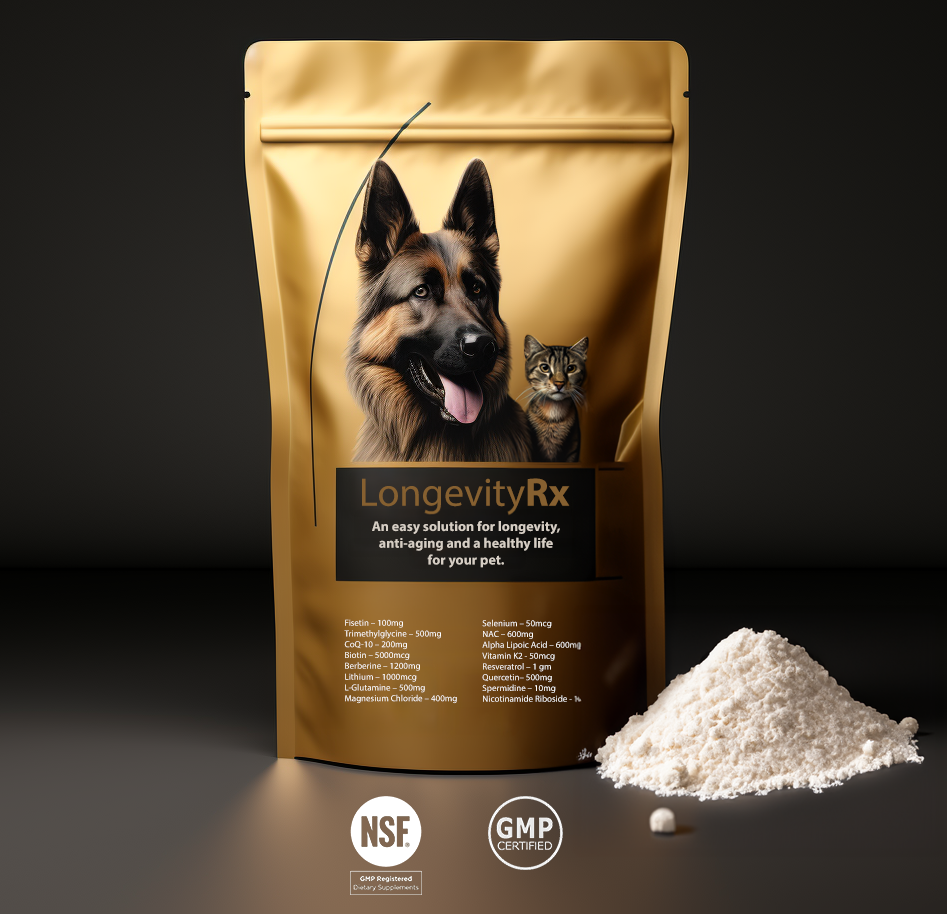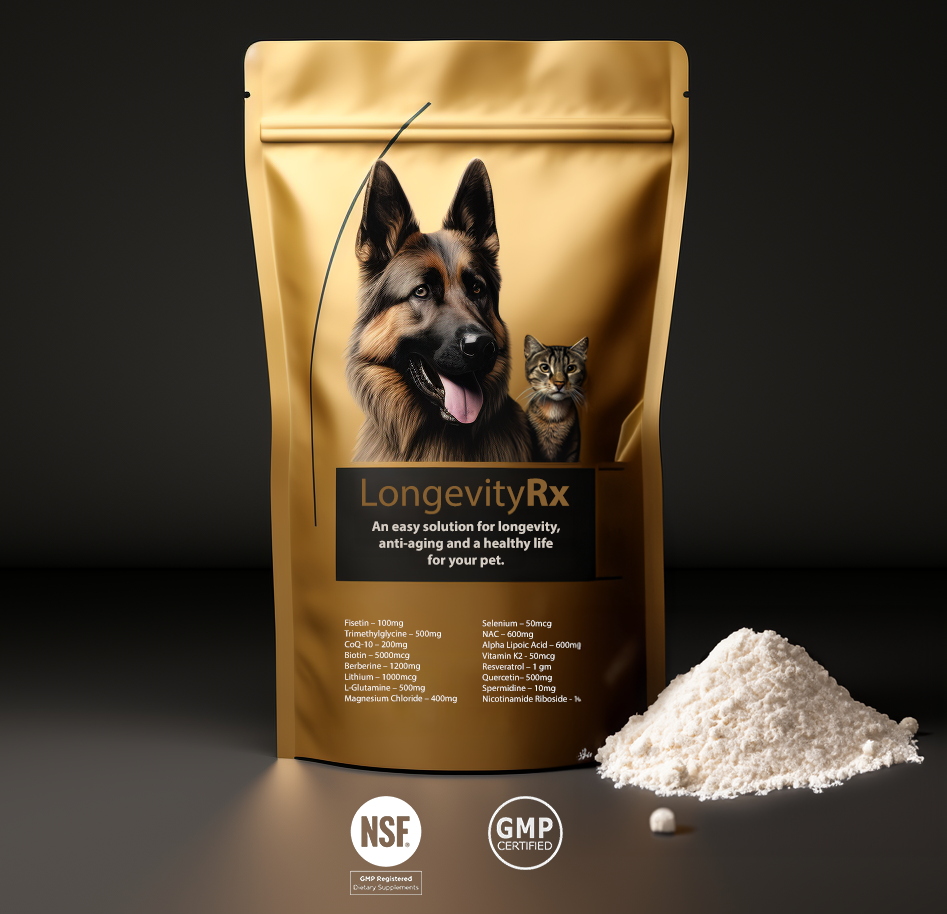A simple solution for a long, healthy life for your pet.

LongevityRx Pets
LongevityRx Pets is a cutting-edge, science-backed solution specially formulated for your beloved dogs and cats. Comprising 15 cutting edge ingredients, this blend supports your pet's body by providing essential compounds and nutrients. Not only does it help maintain longevity and vitality in your pets, but it also promotes overall health and well-being. The ingredients in LongevityRx Pets have been shown to enhance lifespan, combat aging, boost cognitive function, support healthy metabolism, and bolster animals' natural defenses in scientific studies. Simply add a scoop of LongevityPaws to your pet's food.
Share


A comprehensive solution for your pet's longevity in one scoop.
One daily scoop delivers the science-backed supplements your pet needs to live a longer, healthier life.

Fights Aging at Its Source
Our blend works deep within cells to combat the signs of aging, helping to extend youthful vitality and protect against age-related wear and tear.
Boosts anti-aging compound (NAD+) by up to 100%, improve hair and skin health, and improve the cell repair function

Boosts Brain Function and Longevity
Our blend aids in maintaining cognitive function and ensuring mental clarity for your pet even as they age.
Improves cognitive function and protects agains age related cognitive decline

Supports Heart Health in Pets
Let your pet's heart beat with vigor and vitality. Our blend is specially formulated to promote cardiovascular wellness in our furry companions, ensuring their heartbeats remain strong and steady.
Shields Against Heart Conditions. Formulated to offer protection against common age-related heart ailments.

Improve Your Pet's Natural Digestive and Metabolic Health
Keep your pet active and lively. Our blend is designed to support a balanced metabolism, ensuring your furry friend has the energy they need for their daily adventures.
Boosts Metabolic Function. Aids in maintaining a steady metabolic rate, vital for your pet's energy and well-being.

Bolsters Your Pet's Natural Defenses
Equip your furry friend against everyday environmental challenges. Our blend is formulated to detoxify and guard against damaging free radicals, promoting your pet's overall health and vitality.
trengthens Immune Response. Aids in fortifying your pet's immune system, helping them resist common health threats.
15 Ingredients Scientifically Proven To Enhance Longevity
Nicotinamide Riboside
Nicotinamide Riboside (NR) is a vital component that can significantly benefit our pets' health. It acts as a stepping stone to nicotinamide adenine dinucleotide (NAD+), a molecule essential for cellular energy and various biological functions in animals. As pets age, their NAD+ levels naturally decrease, which can be linked to age-related health challenges.
Supplementing with NR has been proven to elevate these NAD+ levels. By enhancing NAD+ concentrations, NR not only promotes better cellular metabolism and energy in pets but also activates specific enzymes, known as sirtuins. These enzymes play a pivotal role in managing aging and maintaining cellular health, potentially offering our furry friends a more vibrant and healthier life.
Resveratrol
Resveratrol, a natural compound found in plants like grapes, berries, and peanuts, holds promising benefits for our pets' health and longevity. Clinical research has highlighted its potential to positively impact lifespan and overall well-being in various animals.
One of the remarkable ways resveratrol works is by activating sirtuins, a group of proteins that play a key role in managing aging and cellular health in animals. This activation can lead to a cascade of benefits for our furry companions, including enhanced DNA repair, reduced inflammation, and improved cellular energy production. By incorporating resveratrol into our pets' regimen, we might be offering them a chance at a more vibrant and extended life.
Berberine
Berberine, a compound derived from certain plants, has shown potential benefits that could greatly enhance the health and longevity of our pets. Research has indicated that berberine can positively influence the lifespan and overall health of cells, which has implications for overall vitality. Notably, in studies involving mice, berberine not only extended their lifespan but also improved their quality of life. Animals where their remaining life expectancy was extended by 80%. Furthermore, these mice displayed noticeable improvements in their overall health, including a denser fur coat and increased activity levels. These findings suggest that berberine could be a valuable addition to our pets' wellness routines, potentially offering them a longer and more vibrant life.
Spermidine
Spermidine is a naturally occurring compound present in the cells of nearly all living beings, including our pets. This compound plays a role in several biological processes and has garnered interest for its potential to enhance longevity and overall health in animals. One of the key mechanisms through which spermidine operates is by inducing autophagy, a cellular process responsible for recycling damaged proteins and components. This process is crucial for cellular upkeep and is associated with extended lifespan in animals.
Furthermore, spermidine has been linked to cardiovascular benefits in animals. Research suggests that an intake of spermidine might lower the risk of cardiovascular issues and bolster overall heart health. A comprehensive review from 2021 in the journal Nutrients found that a higher dietary intake of spermidine was connected to a decreased risk of cardiovascular-related issues in animals.
Additionally, there's growing interest in the cognitive benefits of spermidine for animals. Some studies suggest that spermidine supplementation could enhance memory and cognitive functions in animals. These positive effects might be attributed to spermidine's capacity to boost autophagy, mitigate oxidative stress, and foster neuroprotection. A 2020 study in the journal Translational Psychiatry explored the relationship between spermidine levels and cognitive function, concluding that elevated spermidine concentrations were linked to improved cognitive performance, hinting at its potential role in guarding against age-related cognitive challenges in animals.
Fisetin
Fisetin is a naturally occurring flavonoid present in a variety of fruits and vegetables. Recognized for its antioxidant and anti-inflammatory attributes, fisetin offers potential health advantages for animals, especially concerning longevity and age-related conditions. Research on animals has demonstrated that fisetin can enhance kidney function, diminish age-associated inflammation, and bolster resistance to diseases that commonly afflict animals as they age. Another significant study delved into the effects of fisetin on cellular senescence, a phenomenon where cells lose their capacity to divide and function optimally, a process often linked to aging and related diseases in animals. The findings revealed that fisetin mitigated senescence in animal cells and models of premature aging. Furthermore, it was observed to improve physical functionality and extend the lifespan of animals.
Trimethylglycine (TMG)
TMG, or Trimethylglycine, commonly referred to as betaine, is a compound found in various natural foods. In the realm of animal health, TMG has been spotlighted for its potential benefits that could enhance the well-being and longevity of animals. One of its primary roles is in the regulation of Homocysteine: Within the metabolic processes of animals, TMG is instrumental in the methylation cycle, aiding in the transformation of homocysteine into methionine. Elevated homocysteine levels in animals can be indicative of a heightened risk for cardiovascular issues and other age-related ailments. TMG's involvement in this conversion can assist in sustaining balanced homocysteine levels in animals. Additionally, TMG serves as a cellular guardian: Research has shown that TMG functions as an osmolyte in animals, regulating cell volume and preserving cellular structure. This safeguarding effect can be especially vital during periods of cellular stress or damage, potentially enhancing an animal's lifespan. Lastly, its role as an antioxidant is noteworthy: TMG exhibits antioxidant capabilities, neutralizing detrimental free radicals in an animal's body. By curbing oxidative stress, TMG can aid in averting cellular harm and bolstering the overall health of animals.
CoQ10
Coenzyme Q10 (CoQ10) is a naturally occurring compound present in the cells of animals. It's instrumental in the generation of adenosine triphosphate (ATP), the primary energy currency for cellular activities in animals. Additionally, CoQ10 acts as an antioxidant, shielding animal cells from the detrimental effects of harmful free radicals. Research indicates that CoQ10 can significantly enhance mitochondrial function in animals. As animals age, their mitochondrial efficiency can wane, leading to diminished energy production and heightened oxidative stress. Supplementing with CoQ10 may bolster mitochondrial function, potentially mitigating age-related declines in animals. Moreover, the antioxidant attributes of CoQ10 are thought to play a role in promoting longevity in animals. Oxidative stress, stemming from an imbalance between free radicals and antioxidants, can inflict damage on animal cells and DNA, hastening the aging trajectory. CoQ10 intervenes as an antioxidant, neutralizing free radicals and safeguarding animal cells from oxidative harm.
Biotin
Biotin is essential for animals, playing a pivotal role in their metabolic processes by transforming certain nutrients into energy. It's also vital for maintaining the health of an animal's coat, skin, and claws. Naturally present in many foods, biotin offers a range of health and longevity benefits for animals. These include supporting brain health, reducing the risk of heart-related issues, and bolstering cellular function. A deficiency in biotin can manifest in animals as coat loss, skin issues, and neurological problems.
Biotin is integral to the metabolism of fats, proteins, and carbohydrates in animals. A study on fruit flies (Drosophila melanogaster) revealed that a lack of biotin led to a reduced lifespan, up to 30% shorter than those with sufficient biotin. This deficiency also impacted the fertility of these flies. Interestingly, under oxidative stress conditions, biotin-deficient male flies exhibited increased survival times compared to their biotin-sufficient counterparts. While these findings were in flies, they hint at the potential broader implications of biotin's role in animal health and longevity. To ensure the well-being of animals, it's recommended to provide them with a balanced diet that includes all essential nutrients, biotin being one of them.
L-Glutamine
L-Glutamine, a conditionally essential amino acid found in natural foods, plays a pivotal role in protein biosynthesis and offers a range of health benefits for animals. Research has highlighted the connection between glutamine levels and the aging process in animals. A lack of glutamine can accelerate cellular aging and induce senescence, while its supplementation can shield cells from oxidative stress-induced aging. Furthermore, glutamine is integral for cell growth and survival, aiding in the synthesis of vital physiological molecules, maintaining redox balance, and providing energy.
In the context of neurological health, studies have observed reduced glutamine levels in the brains of animals with Alzheimer-like symptoms. Supplementing with glutamine can diminish inflammation-induced neuronal disruptions and other signs associated with aging. Moreover, glutamine supplementation has shown positive outcomes in healthy animals, including weight management and enhanced cognitive function. A notable study on rats revealed that L-glutamine supplementation post-exhaustive exercise was more beneficial than pre-exercise supplementation. Animals receiving post-exercise glutamine exhibited reduced muscle damage markers and improved blood parameters. They also showed decreased tissue damage in vital organs like the heart and kidneys.
While these findings underscore the potential advantages of glutamine for animals, it's essential to approach supplementation with caution and, where applicable, seek expert advice before introducing it to an animal's diet.
Magnesium
Selenium
N-Acetyl Cysteine (NAC)
Alpha Lipolic Acid
Vitamin K2
Quercetin



